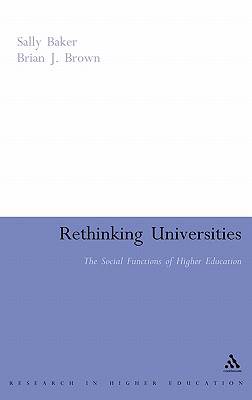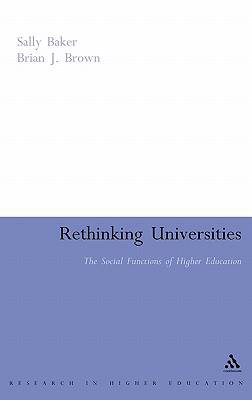
- Afhalen na 1 uur in een winkel met voorraad
- Gratis thuislevering in België vanaf € 30
- Ruim aanbod met 7 miljoen producten
- Afhalen na 1 uur in een winkel met voorraad
- Gratis thuislevering in België vanaf € 30
- Ruim aanbod met 7 miljoen producten
Zoeken
Rethinking Universities
The Social Functions of Higher Education
Sally Baker, Brian J Brown
Hardcover | Engels
€ 339,45
+ 678 punten
Omschrijving
Most people who work and study in universities will be aware that they are changing. Yet few have so far grasped the extent of this change or have attempted to put it in a coherent intellectual framework. This volume provides new ways to understand how the university workforce in developed nations is being encouraged to change itself, and how the social role of these institutions has shifted from places of higher learning toward being agents for social change and the promotion of human welfare. Moreover the demands that are being placed on institutions and the kinds of graduates they are required to produce has changed too, with the emphasis on a new brand of vocationalism and a reinvigorated focus on 'skills' and 'employability'. This volume provides a theoretically informed, philosophically sophisticated account of what universities in developed nations are being encouraged to do, and the impact this has on their staff, students and the societies of which they are a part.
Specificaties
Betrokkenen
- Auteur(s):
- Uitgeverij:
Inhoud
- Aantal bladzijden:
- 192
- Taal:
- Engels
Eigenschappen
- Productcode (EAN):
- 9780826494191
- Verschijningsdatum:
- 14/11/2007
- Uitvoering:
- Hardcover
- Formaat:
- Genaaid
- Afmetingen:
- 164 mm x 235 mm
- Gewicht:
- 426 g

Alleen bij Standaard Boekhandel
+ 678 punten op je klantenkaart van Standaard Boekhandel
Beoordelingen
We publiceren alleen reviews die voldoen aan de voorwaarden voor reviews. Bekijk onze voorwaarden voor reviews.











